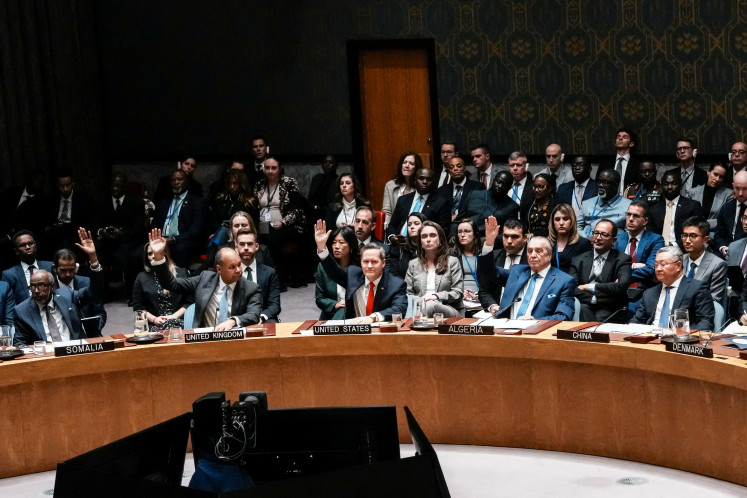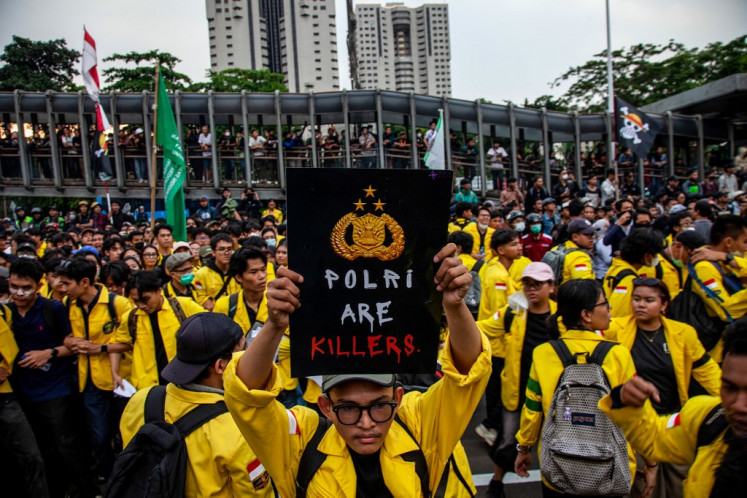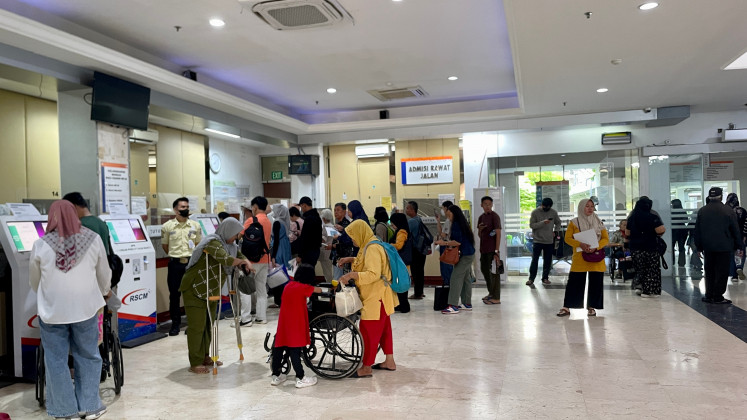Popular Reads
Top Results
Can't find what you're looking for?
View all search resultsPopular Reads
Top Results
Can't find what you're looking for?
View all search resultsCarnegie launches SE Asia unit, with Bakrie funding
The Carnegie Endowment for International Peace, a prestigious foreign policy think-tank organization based in Washington, recently launched its Southeast Asian studies department with funding from the widely diversified Bakrie Group, one of Indonesia's largest business conglomerates
Change text size
Gift Premium Articles
to Anyone
T
he Carnegie Endowment for International Peace, a prestigious foreign policy think-tank organization based in Washington, recently launched its Southeast Asian studies department with funding from the widely diversified Bakrie Group, one of Indonesia's largest business conglomerates.
"Southeast Asian nations are critical players in the international community and global economy," Carnegie vice president Douglas Paal said at the official announcement of the establishment of the Bakrie Chair for Southeast Asian Studies.
"Understanding the political and economic development of the region is essential to policymakers around the world."
Previously, Carnegie's work in Asia has largely focused on China and more recently India, with Paal its most prominent Asian expert.
Billing itself as the first truly global think tank - with offices in Moscow, Beijing, Beirut, Brussels and Washington - the organization welcomes the opportunity provided with Bakrie's "generous pledge" to look at Southeast Asia, and particularly Indonesia, more closely.
(The amount of funding provided to the organization was not disclosed.)
The chair is sponsored by the non-profit Bakrie Foundation Center headed by Anindya Bakrie, one of the most prominent members of a family that founded and controls one of Indonesia's biggest business empires.
The Bakrie Foundation Center provides scholarships to Indonesians to pursue master's or doctoral degrees at top universities in Indonesia and around the world.
Members of the Bakrie clan at the launch included Aburizal, the one-time CEO of the group and a minister in President Yudhoyono's first administration. He is now the chairman of the Golkar Party, Indonesia's second-largest party.
"This is Anindya's show. I had nothing to do with it but I fully support his efforts," Aburizal said.
Also in attendance were Maya Soetoro Ng (the half-sister of US President Barack Obama), representatives from the Indonesian embassy, other ASEAN member states, businesses and organizations with interests in Indonesia, as well as Jeffrey Beda of the National Security Council and Stapleton Roy, a former US ambassador to Indonesia.
Missing however was former Indonesian finance minister Sri Mulyani Indrawati, who had been invited to the event. Her appearance would have provided an opportunity for her and Aburizal to mend fences.
Sri Mulyani, now a managing director at the World Bank, quit her Cabinet post in May after Aburizal's Golkar succeeded in its campaign to discredit her for her 2008 decision to bail out the ailing Bank Century.
"She has been very busy," an Indonesian diplomat close to her said.
Paal said the endowment had not yet selected the person to take up the chair, preferring to look at more names before making the decision.
"It is important for us to get it right the first time," he said.
The candidate must have a deep understanding of the region and be able to explain to the American public, he said. Excellence, rather than nationality, is what we are looking for, Paal said, pointing out that Carnegie's office in Moscow is staffed entirely by Russians.
"Our policy is to get as diverse perspectives as possible, so our Russian office has done a good job in explaining the Russian perspective on many issues," he said.
Paal said two events in the last two weeks had raised the public profile of Indonesia and Southeast Asia in the United States, making the establishment of the Bakrie chair even more timely.
One was the announcement by US Secretary of State Hillary Clinton at a meeting with her ASEAN partners in Hanoi last week that the United States would join the East Asia Summit (EAS) beginning this year; the other was the US decision to resume military cooperation with Indonesian Army's Special Forces (Kopassus) as announced by US Defense Secretary Robert Gates in Jakarta the week earlier.
The EAS, currently comprising 10 ASEAN countries and Japan, China, Korea, India, Australia and New Zealand, has decided to admit the United States and Russia to its annual gatherings, making it now the most likely platform for the establishment of pan-Asia architecture. The summit was an ASEAN initiative to launch discussions on building an Asia Pacific community.
The establishment of the new Southeast Asian unit at Carnegie was widely hailed by the foreign policy establishment in Washington, many of whom felt that the region was not represented at a level commensurate with the important role it plays, especially at a time when more attention is being paid to China and India.
The Center for Strategic and International Studies in Washington and Johns Hopkins University are the only two other institutions in the US capital that conduct Southeast Asian studies on regular bases.
"That's hardly enough," said Benjamin Reilly, an Australian scholar teaching at Johns Hopkins, and one of only two guests at the reception wearing a batik shirt.










